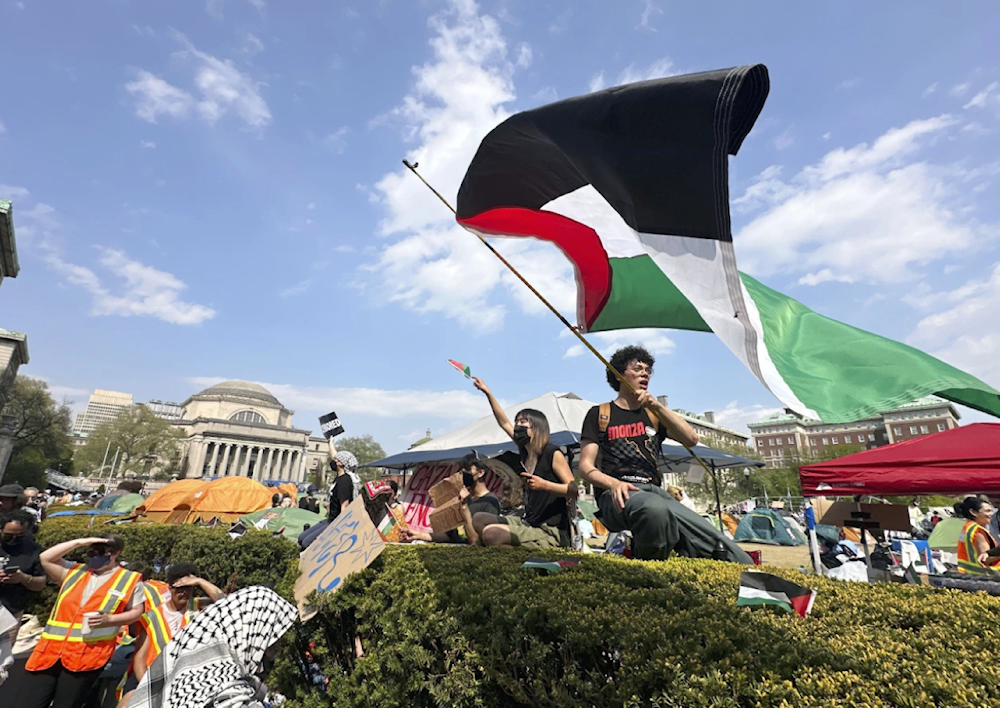State Dept official admits criticism of 'Israel' can lead to visa loss
A senior State Department official has testified that the agency has lacked a clear definition of antisemitism while routinely factoring criticism of "Israel" into visa decisions.
-

A demonstrator waves a flag on the Columbia University campus at a pro-Palestine protest encampment in New York on April 29, 2024. (AP)
A senior State Department official testified Friday that his office, which the Trump administration tasked with reviewing foreign students’ social media and revoking student visas, has operated this year without a clear definition of “antisemitism", while regularly treating criticism of "Israel" as part of its review process, according to The New York Times.
The testimony came during the final days of a two-week federal trial in Boston, where academic groups argued that the administration targeted students, such as Mahmoud Khalil and Rumeysa Ozturk, based on their political speech about "Israel."
Under questioning, John Armstrong, a top official in the Bureau of Consular Affairs, acknowledged that the State Department considers speech or actions perceived as hostile toward "Israel" when assessing visas.
Pressed for specifics, Armstrong said that statements like calling for limits on US military aid to "Israel" or “denouncing Zionism” could be grounds for visa denial or revocation.
Clear definition of antisemitism lacking
During a federal court hearing, Alexandra Conlon, a lawyer for the plaintiffs, asked State Department official John Armstrong whether criticism of "Israel’s" actions in Gaza could factor into visa decisions. Armstrong replied that it could, depending on the nature of the statement; for example, equating "Israel’s" actions to those of Hitler might raise concerns.
However, Armstrong admitted that the State Department lacked a consistent or official definition of "antisemitism" to guide such reviews. “I cannot remember a concrete piece of guidance,” he said, noting that there was no clear cable that defined antisemitism for consular officers.
'Totality of situation' considered
Earlier in his testimony, Armstrong emphasized that decisions were based on “the totality of the situation,” especially when recommending deportation. In cases like that of Mahmoud Khalil, a lawful permanent resident, immigration law required personal approval from Secretary of State Marco Rubio to proceed with deportation efforts.
At one point during the trial, Judge William G. Young pressed John Armstrong for clarity on how he personally determined whether a statement or action was "antisemitic".
Armstrong responded, “In my opinion, antisemitism is unjustified views, biases or prejudices or actions against Jewish people — or Israel — that are the result of hatred towards them."
While Armstrong did not claim that his office pursued deportations based solely on criticism of "Israel", he acknowledged that such commentary, much of which the plaintiffs argue is protected by the First Amendment, was regularly considered in visa decisions.
Attorney Alexandra Conlon followed up, "In your understanding, antisemitism includes hatred or prejudice against Israel and Israeli people, right?”
“Yes,” Armstrong confirmed. He went on to say, “In my understanding, antisemites will sometimes try to hide their views and say they’re not against Jews — they’re just against Israel — which is a farcical argument, in my mind,” adding that it was "just a dodge."
Trump-era executive order
The heightened focus on antisemitism in higher education traces back to a Trump-era executive order issued in January, which directed federal agencies to push colleges to report any activities by foreign students or staff that could be interpreted as "antisemitic" or "supportive of terrorism." Such reports could trigger investigations or lead to deportations.
During Friday’s proceedings, Armstrong at times pushed back against attorney Alexandra Conlon’s line of questioning, suggesting it downplayed the risks involved.
“This is not a mundane thing,” he said. “If we get this wrong, we get the Molotov cocktail attack in Colorado. If we get these sort of things wrong, you get the Boston bomber. If we get this stuff wrong, you get 9/11.”
Criticism of 'Israel' not considered support of Hamas
Despite his warnings, Armstrong’s testimony appeared to lend support to key claims made by the American Association of University Professors, which filed the lawsuit. The organization argues that arrests of students like Mahmoud Khalil and Rumeysa Ozturk are part of a broader, systematic policy of targeting individuals based on their speech.
On Thursday, after nearly two weeks of testimony, Judge William G. Young offered his own reflections from the bench, signaling how seriously the court is weighing the case.
Although the government has consistently argued that the remarks discussed on Friday were not only antisemitic but also showed direct sympathy for Hamas and other resistance organizations, Judge William G. Young reached a different conclusion, finding that such statements almost certainly fall under the protection of the First Amendment.
“Criticism of the state of Israel, use of the words that I mentioned, does not — it’s political speech — it does not constitute pro-Hamas support,” Judge Young said, adding that in order for statements to be considered pro-Hamas, there "has to be something more than that."

 5 Min Read
5 Min Read










